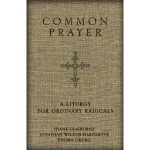Shane Claiborne, Jonathan Wilson-Hartgrove, and Enuma Okoro. Common Prayer: A Liturgy for Ordinary Radicals. Zondervan: 2010. ISBN: 9780310326199.
Meet the Authors/Compilers
Shane Claiborne is a founder of The Simple Way, a New Monastic community in inner city Philadelphia that has helped to birth and connect radical faith communities around the world. He is the author of The Irresistible Revolution: Living as an Ordinary Radical. Claiborne is the co-author of Jesus for President: Politics for Ordinary Radicals (with Chris Haw), Becoming the Answer to Our Prayers: Prayer for Ordinary Radicals (with Jonathan Wilson-Hartgrove) and Follow Me to Freedom: Leading as an Ordinary Radical (with John Perkins).
Jonathan Wilson-Hartgrove resides in Durham, North Carolina where he serves as an associate minister at the historically black St. John’s Missionary Baptist Church and the director of the School for Conversion, which works to foster community and form people in the way of Jesus. He is the author of New Monasticism: What it has to Say to Today’s Church, Free to be Bound: Church Beyond the Color Line, and God’s Economy: Redefining the Health and Wealth Gospel. Wilson-Hartgrove is editor of the New Monastic Library Series (Cascade Books) and associate editor of the Resources for Reconciliation Series (InterVarsity Press) and has co-authored or contributed to numerous books.
Enuma Okoro was born in the United States and raised in Nigeria, Ivory Coast, and England. She is the author of Reluctant Pilgrim: A Moody, Somewhat Self-Indulgent Introvert’s Search for Spiritual Community and writes regularly for Augsburg Fortress, United Methodist Publishing House, and Weavings. Okoro works as a full time writer, speaker, and workshop/ retreat leader.
Book Basics
Common Prayer: A Liturgy for Ordinary Radicals is a contemporary prayerbook grounded in antiquity that seeks to introduce the rhythm of daily prayer to Evangelicals with limited familiarity with the church year while also providing a new resource for those already familiar with such. The book offers seven evening prayers, a morning prayer for each day of the year as well additional prayers designed for Holy Week, a midday prayer, occasional prayers, and a songbook. In keeping with the intent of providing an updated and relevant resource, the morning prayers introduce a wide variety of saints (including both those who are recognized by the Roman Catholic Church and/or the Eastern Orthodox Church and those with no such formal recognition) and the prayer book itself is supplemented by resources provided on a website. Additionally, each month begins with a brief article on one of the twelve marks of New Monasticism:
 Relocation to the abandoned places of Empire.
Relocation to the abandoned places of Empire.- Sharing economic resources with fellow community members and the needy among us.
- Hospitality to the stranger.
- Lament for racial divisions within the church and our communities combined with the active pursuit of a just reconciliation.
- Humble submission to Christ’s body, the church.
- Intentional formation in the way of Christ and the rule of the community along the lines of the old novitiate.
- Nurturing common life among members of intentional community.
- Support for celibate singles alongside monogamous married couples and their children.
- Geographical proximity to community members who share a common rule of life.
- Care for the plot of God’s earth given to us along with support of our local economies.
- Peacemaking in the midst of violence and conflict resolution within communities along the lines of Matthew 18.
- Commitment to a disciplined contemplative life.
So What?
Common Prayer’s impact shouldn’t be measured in the number of copies sold, but in the number of Christians who find their way into a deeper understanding of Christian community through their initial experiences with a prayerbook.
- Do you think this prayerbook will reach a significant number of disciples who have never used a prayerbook and who may have little or no connectivity to the church year? Why or why not?
- Is using a prayerbook a part of your tradition? If so, how has it enriched your faith? If not, how might it supplement your current spiritual practices?
- What are your initial impressions of the twelve marks of New Monasticism? What gifts might this movement have to offer the wider church?